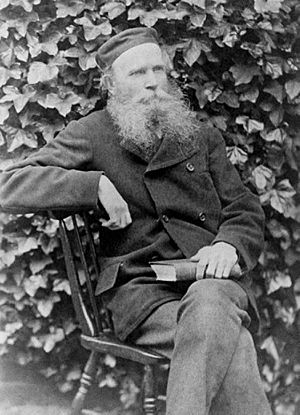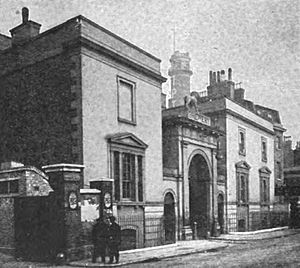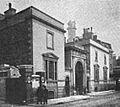William Chester Minor facts for kids
Quick facts for kids
William Chester Minor
|
|
|---|---|

Minor c. 1900
|
|
| Born | June 22, 1834 |
| Died | March 26, 1920 (aged 85) Hartford, Connecticut, United States
|
| Alma mater | Yale University |
| Known for | Contributions to the Oxford English Dictionary |
| Relatives | Thomas T. Minor (half-brother) |
| Military career | |
| Allegiance | Union (United States) |
| Service/ |
Union Army |
| Years of service | 1863/1864 to 1871 |
| Rank | Commissioned officer (surgeon) |
| Battles/wars | Battle of the Wilderness |
William Chester Minor (born June 22, 1834 – died March 26, 1920) was an American army doctor. He became famous for helping to create the Oxford English Dictionary while he was a patient in a special hospital in England.
Minor served as a surgeon in the American Civil War. After the war, he moved to England. He suffered from serious mental health problems, which caused him to believe things that were not real. Because of his condition, he was admitted to a British hospital for people with mental health issues, where he stayed for many years.
Even while in the hospital, Minor made huge contributions to the Oxford English Dictionary. He was one of the most helpful volunteers. He read many old books from his own large library. From these books, he collected examples of how different words were used.
In 1910, Winston Churchill, who was a government official at the time, ordered Minor to be sent back to the United States. Minor was then cared for in a hospital in Connecticut, where he passed away in 1920.
Contents
Early Life and Education
Minor was born in Ceylon (which is now Sri Lanka) on June 22, 1834. His parents, Eastman Strong Minor and Lucy Bailey, were church missionaries from New England. He had several half-siblings, including Thomas T. Minor, who later became the mayor of Seattle, Washington.
When he was 14, William was sent to the United States. He lived with relatives in New Haven and went to the Russell Military Academy. Later, he studied at the Yale School of Medicine. To pay for his studies, he worked part-time as a teacher at the Russell Academy. He also helped with the 1864 update of Webster's Dictionary, which was being prepared at Yale. Minor finished his medical degree in 1863. He specialized in studying the body structures of different animals. After a short time at a hospital in New Haven, he joined the Union Army.
Military Service
Minor became a surgeon in the Union Army. He might have been present at the Battle of the Wilderness in May 1864. This battle was known for the very high number of soldiers who were injured or died on both sides.
After the Civil War ended, Minor worked in New York City. By 1867, he was moved to a distant military post in Florida Panhandle. By 1868, his mental health had gotten worse. He was admitted to St. Elizabeths Hospital, which was a hospital for people with mental illnesses in Washington, D.C. He stayed there for 18 months but did not get better.
Moving to England
In 1871, Minor traveled to London, England. He hoped that a change of scenery would help his mental condition. However, in 1872, his mental health problems continued. On February 17, 1872, he sadly shot a man named George Merrett. Minor wrongly believed that Merrett had broken into his room. George Merrett was on his way to work to support his family, which included his pregnant wife and six children.
After this event, Minor was sent to a prison in London while waiting for his trial. The court later found him not guilty because of his mental illness. He was then sent to the Broadmoor asylum, a special hospital in the village of Crowthorne, Berkshire. Because he received a pension from the US Army and was not considered dangerous, he had comfortable living spaces. This allowed him to buy and read many books.
Helping the Oxford English Dictionary
It was likely through his letters with booksellers in London that Minor learned about the call for volunteers for the Oxford English Dictionary (OED). He spent most of the rest of his life working on this project. He became one of the most helpful volunteers for the dictionary. He would read through his large collection of old books. From these books, he would find and write down quotes that showed how specific words were used.
The people creating the dictionary would publish lists of words for which they needed examples of how they were used. Minor was able to provide these examples more and more easily as the lists grew. For many years, the editor of the OED, James Murray, did not know about Minor's past. In January 1891, Murray finally learned about Minor's story and visited him. Murray visited Minor many times after that. In 1899, Murray praised Minor's huge help to the dictionary. He said that they could easily show how words were used over the last four centuries just from Minor's quotes alone.
Images for kids
See also
 In Spanish: William Chester Minor para niños
In Spanish: William Chester Minor para niños
 | Kyle Baker |
 | Joseph Yoakum |
 | Laura Wheeler Waring |
 | Henry Ossawa Tanner |




